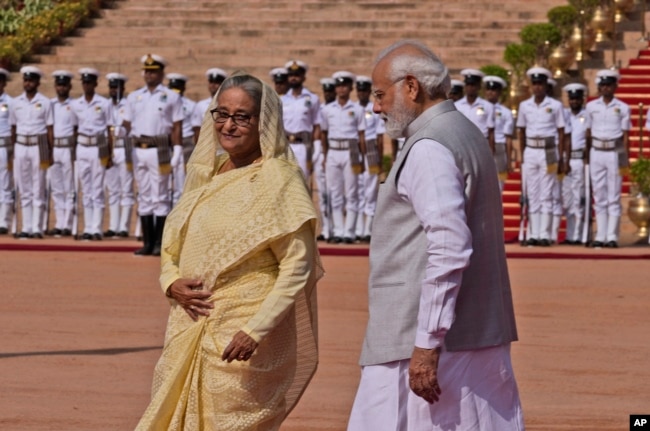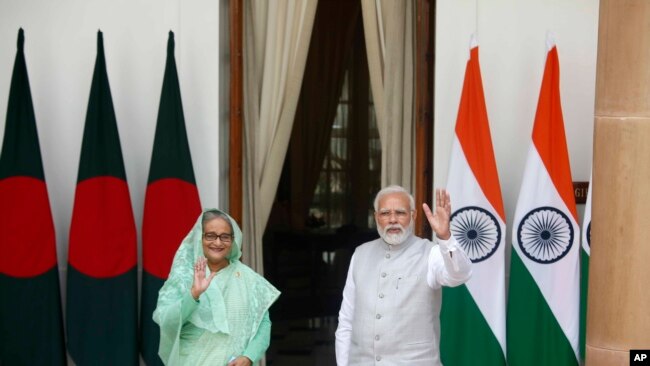インドとバングラデシュ、水資源の共有を目指す
水、それは国家戦略問題です!!
香港は、香港内の水源地だけでは生活用水が賄えないため、1960年から生活用水の70~80%を広東省東江に頼っていました。香港問題の根底にあったとも言われています
近年、日本各地で海外資本による水源林地購入がみられ、その数は増加する一方です。このままで本当に日本の水源林地を保全・維持できるのと政府は考えているのでしょうか?
当選だけを目指している政治家レベルでは、水の重要性を考えているとは到底思えません!!
VOAで英語を学びましょう!!
インドとバングラデシュ、資源と開発の共有化を目指す(和訳)
India, Bangladesh Aim to Share Resources, Development
September 09,2022
インドとバングラデシュは、水の共有に関する協定に調印しました。この協定により、両国はクシヤラ川の利用で協力することに合意しました。
バングラデシュのシェイク・ハシナ 首相とインドのナレンドラ・モディ首相は、他の6つの協定に署名しました。それらは宇宙技術や科学的な協力に関する取引を含んでいます。
ハシナ首相は、多くの人が彼女の母国にとって政治的に重要であると考えているインドへの4日間の訪問で協定に署名しました。来年には総選挙が予定されています。
クシヤラ川に関する取引は、1996年以来、両国間で初めてのものです。インドのアッサム州南部とバングラデシュのシレット地域を助けることになる、とモディ大統領は述べています。
しかし、両国は別の河川については合意に達することができませんでした。バングラデシュは長年にわたり、主要な国境の川であるティースタ川の水共有に関する協定を推進してきました。この川はインドのシッキム州に端を発し、西ベンガル州北部を経てバングラデシュに流れ込んでいます。
2011年、インドは12月から3月までの乾季に水を共有することに合意しました。しかし、西ベンガル州の州首相が反対したため、合意には至りませんでした。この未解決の問題は長い間バングラデシュを怒らせ、多くの人が協定に進展がないとしてモディに批判してきました。
ハシナ氏は2009年に首相に就任して以来、インドと強い関係を保っています。彼女はこう言いました:「私たちは、ティースタ水共有条約を含むすべての未解決の問題が早期に締結されることを望んでいる」と記者団に語りました。
両首脳はまた、原子力エネルギーパートナーシップ、テロ、洪水防止について話しました。
また、彼らはマイトリー火力発電所の第1部の完成を発表しました。これは、バングラデシュの電力生産を改善するための共同プロジェクトです。このプロジェクトは、長い間、地元や世界の反対を受けてきました。
2016年、国連機関ユネスコは、スンダルバンス国立公園の世界最大のマングローブ林を脅かすものだと言いました、その公園は15kmも離れていません。
この発電所は、生涯で最大5億9200万トンの二酸化炭素を放出すると予想されていると、エネルギー経済・金融分析研究所、研究団体は言います、しかし、特にロシアのウクライナ侵攻後にエネルギー価格が上昇したため、両国の当局者はこのプロジェクトを支持しています。
先月、バングラデシュは電力使用量を減らすため、毎週1日余分に学校を休みにし、政府機関は勤務時間を1時間短縮するよう命じました。
中国もバングラデシュの多くの主要なインフラプロジェクトに関与しています。インドは、この発電所のような共同プロジェクトにもっと参加することを目指しています。インドは現在、バングラデシュの南アジアにおける最大の貿易相手国です。
両首脳は今年中に、より大規模な経済連携協定の交渉を開始するよう閣僚に指示しました。
ハシナ氏は、インドは "バングラデシュにとって最も重要で、最も近い隣人 "であると述べています。
India, Bangladesh Aim to Share Resources, Development
India and Bangladesh have signed a water-sharing agreement. Under the deal, the two countries agreed to cooperate in the use of the Kushiyara River.
Bangladesh Prime Minister Sheikh Hasina and Indian Prime Mister Narendra Modi signed six other agreements. They included deals on space technology and scientific cooperation.
Hasina signed the deal on a four-day visit to India that many consider politically important for her home country. A general election is planned for next year.
The deal on the Kushiyara River is the first of its kind between the countries since 1996. It will help southern parts of Assam state in India and the Sylhet area in Bangladesh, Modi said.
But the two countries could not reach an agreement on another river. For many years, Bangladesh has pushed for a deal on water sharing for the Teesta River, a major border river. It begins in India’s Sikkim state and runs through the north of West Bengal state before entering Bangladesh.
In 2011, India agreed to share water during the dry season, between December and March. But a deal was never reached because of opposition from West Bengal state’s chief minister. The unresolved issue has long angered Bangladesh, where many have been critical of Modi for not making progress on the agreement.
Hasina has kept a strong relationship with India since becoming prime minister in 2009. She said: “We hope that all our outstanding issues, including the Teesta water sharing treaty, would be concluded at an early date,” she told reporters.
The two leaders also spoke about nuclear energy partnerships, terrorism and preventing floods.
They also announced the completion of the first part of the Maitree Thermal Power Plant. It is joint project that will improve Bangladesh’s electricity production. The project has long faced local and worldwide opposition.
In 2016, the United Nations agency UNESCO said it threatens the world’s largest mangrove forests in the Sundarbans national park, which are less than 15 kilometers away.
The power plant is expected to release up to 592 million tons of carbon dioxide over its lifetime, said the Institute for Energy Economics and Financial Analysis, a research group. However, officials in both countries have backed the project, especially since energy prices have increased after Russia’s invasion of Ukraine.
Last month, Bangladesh ordered schools to close an extra day each week and government offices to cut short their workdays by an hour to reduce electricity use.
China also is involved in many major infrastructure projects in Bangladesh. India has aimed to get involved in more joint projects like the power plant. India is currently Bangladesh’s largest trading partner in South Asia.
Both leaders have directed their ministers to begin negotiations on a larger economic partnership agreement this year.
Hasina said India is “the most important, closest neighbor for Bangladesh.”
Words in This Story
outstanding — adj. continuing to exist
mangrove — n. a tropical tree that grows big roots in shallow water or watery places
infrastructure — n. structures needed for modern life like roads, bridges, ports and factories

